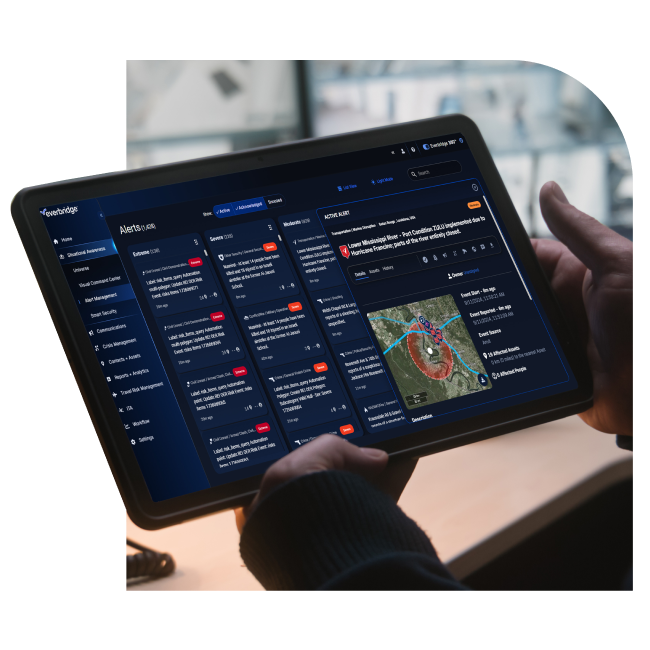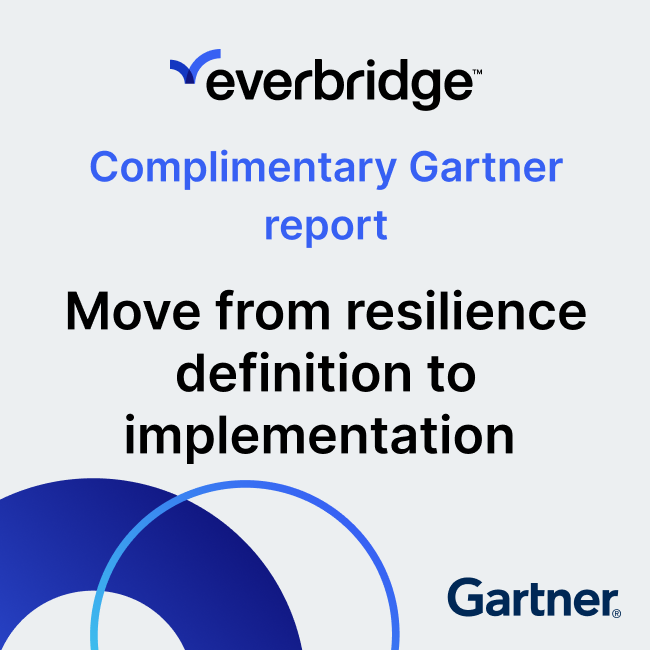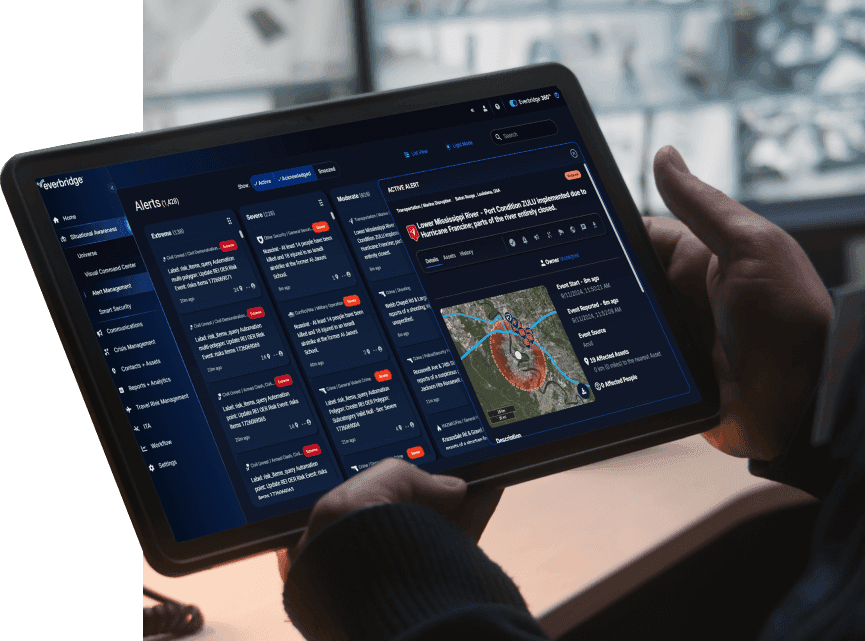Crisis communications and alerting
Proactive crisis communication strategies to ensure crisis resilience.

Protect critical business operations
Crisis communications is a crucial organizational function that emphasizes preparedness and strategic planning to effectively navigate and mitigate the impact of critical events. By proactively identifying potential threats and deploying cutting-edge technology, powered by Purpose-built AI, organizations can ensure they are equipped to handle emergencies swiftly. This approach not only safeguards people and assets but also helps maintain business continuity and protect brand reputation during crises.
Get complimentary access to the Gartner report: Moving resilience from definition to implementation.
Common communication challenges during a crisis
Speed
Ensuring quick and clear communication across all levels of an organization can be challenging during a crisis, leading to misinformation and confusion.
Lack of preparedness
Many organizations struggle with inadequate crisis plans, which leaves them vulnerable when unexpected events occur, resulting in delayed responses and increased impact.
Resource allocation
Effectively managing and allocating limited resources during a crisis can be difficult, often leading to inefficiencies and hindering swift recovery efforts.

Redefining crisis management: The future of business continuity
Watch industry experts as they demonstrate how to:
- Develop innovative strategies for crisis preparedness and response.
- Build strong resilience against both global and local disruptions, ensuring effective crisis management.
- Utilize leadership, personnel, and technology to smoothly navigate pre-crisis, crisis-response, and post-crisis phases.
Benefits
- Enhanced communication: minimizing misinformation and confusion during crises.
- Improved response times: by automating processes and utilizing critical event management tools.
- Comprehensive resource management: ensuring a seamless and coordinated response.
- Real-time data analytics: allowing organizations to make informed decisions quickly and adapt their strategies based on the latest information.
- Enhanced stakeholder engagement: leading to a more cohesive and efficient crisis response.
- Multi-channel communication: ensuring messages reach the right people at the right time.

Features
- Critical event management technology: ensuring timely and effective responses.
- Automated emergency notifications: ensuring rapid dissemination of crucial information to the right people in real-time.
- Real-time collaboration tools: enhancing coordination during crises.
- Resource allocation capabilities: ensuring that organizational assets are utilized optimally during critical events.
- Scenario-based testing: allowing organizations to identify and address potential gaps in their strategies.
- Comprehensive crisis management planning: that covers all aspects from prevention to recovery, ensuring organizational resilience.
Everbridge provides dependable solutions in critical scenarios
Independent Bank explains how Everbridge ensures resilience and seamless communication during critical moments, even when other systems fail.
Solution
Everbridge offers a crisis communication solution that stands out. Our High Velocity Critical Event Management™ platform, Everbridge 360, enables automated emergency notifications and real-time collaboration tools that streamline communication and coordination during crises. The platform enhances response times and ensures efficient resource allocation, supporting organizations with comprehensive crisis management planning. Additionally, its scenario-based testing allows for identifying and addressing potential strategy gaps, ultimately bolstering organizational resilience and ensuring a proactive approach to handling critical events effectively.


MLC Life Insurance strengthens crisis communications capabilities with Everbridge
MLC Life Insurance is one of Australia largest insurance companies, serving customers for more than 135 years. MLC Life insurance offers a wide range of life insurance options to their 1.2 million customers, from total life coverage to critical illness, total and permanent disability, and more. As an Everbridge customer, MLC Life Insurance relies on Safety Connection and Crisis Management to keep their employees safe and informed during crises.
How it works
The Everbridge crisis communication solution operates by leveraging critical event management technology to automate emergency notifications and facilitate real-time collaboration. This process ensures efficient resource management, allowing organizations to swiftly activate crisis management plans. By enhancing communication across all levels, the platform enables a coordinated response to critical events, minimizing crisis impact. These integrated elements bolster organizational resilience, ensuring that potential disruptions are effectively managed and mitigated.


Get complimentary access to the Gartner report: Moving resilience from definition to implementation
In our view, this report will enable you to:
- Harness Al to boost resilience
- Safeguard IT infrastructure
- Foster collaboration for stronger strategies
For a limited time. Don’t miss out.
Outcome
Implementing Everbridge crisis communication and management solutions help organizations effectively navigate critical events by utilizing advanced technology and strategic planning, powered by Purpose-built AI. Its resource allocation capabilities ensure optimal use of assets during crises, while comprehensive crisis management planning aids in preparedness and recovery. These features collectively enhance response times, streamline communication, and bolster organizational resilience, minimizing the impact of crises.

During a crisis, communication is key
Connect with employees, mobilize teams, and restore order with ease. Discover how the Everbridge Mass Notification platform can help you deliver messages across various channels during a crisis. Safeguard your people, ensure operational continuity, and fortify your critical communications.
Industry solutions for crisis communication
IT
In the IT industry, crisis communications play a crucial role in maintaining transparency and managing stakeholder expectations during disruptions. By ensuring effective communication, IT firms can promptly address concerns, provide critical updates, and safeguard their reputation. These efforts help stabilize operations, mitigate misinformation, and build trust with clients and partners in challenging times.

Financial services
For financial institutions, crisis communications are vital in managing customer trust and regulatory compliance during unforeseen events. By delivering clear, timely updates, banks can address stakeholder concerns and maintain confidence. Effective communication strategies help prevent misinformation, support financial stability, and protect institutional reputation, ensuring a swift recovery and continuity of essential services.

Telecomm
In the telecomm industry, crisis communications are essential for ensuring customer trust and service reliability during disruptions. By providing timely and accurate information, telecom providers can manage customer expectations and mitigate service-related concerns. These efforts help maintain operational transparency, strengthen customer loyalty, and support the seamless restoration of services, minimizing reputational damage.

Government
For governments, crisis communications are pivotal in maintaining public trust and ensuring the delivery of essential information during emergencies. By providing clear, accurate updates, governments can manage public expectations and reduce misinformation. These strategies foster community resilience, support effective crisis management, and uphold the integrity of public communication channels, ensuring societal stability and security.

Supply chain
For organizations which manage supply chains, crisis communications are crucial for maintaining transparency and managing partner expectations during disruptions. By providing accurate, timely updates, companies can coordinate effectively with stakeholders and mitigate logistical concerns. These efforts support seamless operations, protect reputations, and foster collaboration, enabling organizations to navigate challenges and maintain supply chain resilience.

Corporate industry
For corporate businesses, crisis communications are vital in managing stakeholder expectations and protecting brand reputation during disruptions. By delivering clear, consistent updates, companies can maintain trust and mitigate misinformation. Effective communication strategies help stabilize operations, support employee morale, and ensure continuity, enhancing corporate resilience and preserving long-term business sustainability in challenging times.

Healthcare industry
In the healthcare industry, crisis communications are essential for ensuring patient trust and managing public expectations during emergencies. By providing timely, accurate information, healthcare providers can address concerns and maintain service integrity. These strategies support effective crisis management, enhance organizational reputation, and ensure the reliable delivery of critical medical services, safeguarding public health and safety.


You’re In Charge: Can You Keep the Business Running?
Step into a crisis as the leader everyone relies on. Make real-world decisions, see the impact, and explore how your choices shape organizational response and resilience – in this interactive scenario created in partnership with Security Magazine.
Additional resources

Perspectives of global crisis management: Niklas Henningsson, Group Risk Manager at PostNord
One click. Everyone is on alert. In a crisis, Group Risk Manager, Niklas Henningsson, clicks one computer key to alert and assemble the entire PostNord team in seconds.

Crisis management plan template
A crisis management plan (CMP) is a vital document detailing procedures and strategies for handling crises to minimize the impact on operations, reputation, and stakeholders.

How to create a crisis communication plan
When a crisis hits, the success of an organization often hinges on how effectively it communicates. This is why having a robust crisis communication plan is critical.

Santander saves time and cost with critical event management
Within a single platform, Santander coordinates all response activities, teams, and resources to accelerate recovery times and maintain command and control during a crisis.

Crisis communications tabletop exercise guide
A facilitated discussion with leaders about communicating emergency information to employees and key stakeholders

Redefining crisis management: The future of business continuity
This session is for anyone dedicated to protecting their people, physical infrastructure, and supply chain, while securing their organization’s future. Don’t miss this chance to ensure your business thrives amid unprecedented challenges.

Crisis communications FAQs
Crisis communications involves managing information during emergencies to maintain public trust, deliver timely and meaningful status updates, and protect an organization’s reputation through strategic messaging and proactive engagement with stakeholders.
Effective crisis management is crucial as it helps organizations minimize damage, maintain their reputation, and ensure business continuity in the face of unexpected challenges. It also allows for quick recovery and minimizes the impact on stakeholders.
A crisis communications plan’s key components include clear communication channels, designated spokespersons, pre-approved messaging, stakeholder identification, and information to ensure that responders know what to do in a crisis. It should also include monitoring systems to ensure effective, consistent, and timely responses during a crisis situation.
Organizations can prepare by conducting risk assessments to identify potential threats, developing a comprehensive crisis management plan, training employees, and conducting regular drills. Establishing clear communication channels and roles is also vital for preparedness.
Start by identifying potential risks and vulnerabilities. Develop strategies for each type of crisis, establish clear protocols and communication channels, and assign roles and responsibilities. Regularly review and update the plan, and conduct training and exercises to ensure effectiveness.


